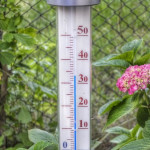
Summer heatwave led to increase in subsidence claims
Little in the way of rainfall and exceptionally high temperatures have led to a surge in subsidence claims in the UK.
The remarkably hot, dry, weather across the country has raised concerns that subsidence claims will break records this year. LV, one of Britain's largest insurers, stated that subsidence claims rose 200 per cent in the first two weeks of August, compared with the same period last year.
Subsidence arises more frequently in hot weather because buildings' foundations can sink when soil dries out. A nationwide heatwave in 2018 caused a 51 per cent rise in claims year on year.
Additionally, Gallagher, an insurer, said the average claim for subsidence was £12,500. However, in the worst cases, such as when the foundations of a property require underpinning, bills could reach six figures.
LV added that hosepipe bans may worsen subsidence issues as low soil moisture levels can exacerbate problems. Welsh Water, South East Water, and Southern Water have already imposed hosepipe bans, and South West Water and Yorkshire Water are due to implement bans in the last week of August.
Despite the recent rain and thunderstorms, Thames Water is set to become the fifth water provider to announce a ban which will affect 10 million households in London and the Thames Valley.
LV said that the hot summer has also led to a surge in domestic fire-related claims, most of which have been caused by fires that had spread from nearby open heathland. It added that the parched soil and an increased risk of fire were evidence that climate change was beginning to have an impact on home security.
Typical signs of subsidence include new or widening cracks in walls, ceilings and outside brickwork, stuck doors and windows, sloping floors and ripples in dry wallpaper. Homeowners have been urged to examine their homes for potential issues.
PM Law
Sheffield Solicitors
0114 249 6926
Get in touch
with your query or requirements
Conveyancing, Cavity Wall, and Employment Solicitors
For You. For your Family. For your Future.
Specialist cavity wall compensation, Landlord neglect and Claims solicitors.
We are a full services law firm dedicated to our national client base.
Contact
PM House,
250 Shepcote Lane,
Sheffield,
S9 1TP
0114 220 1795
250 Shepcote Lane,
Sheffield,
S9 1TP
0114 220 1795





